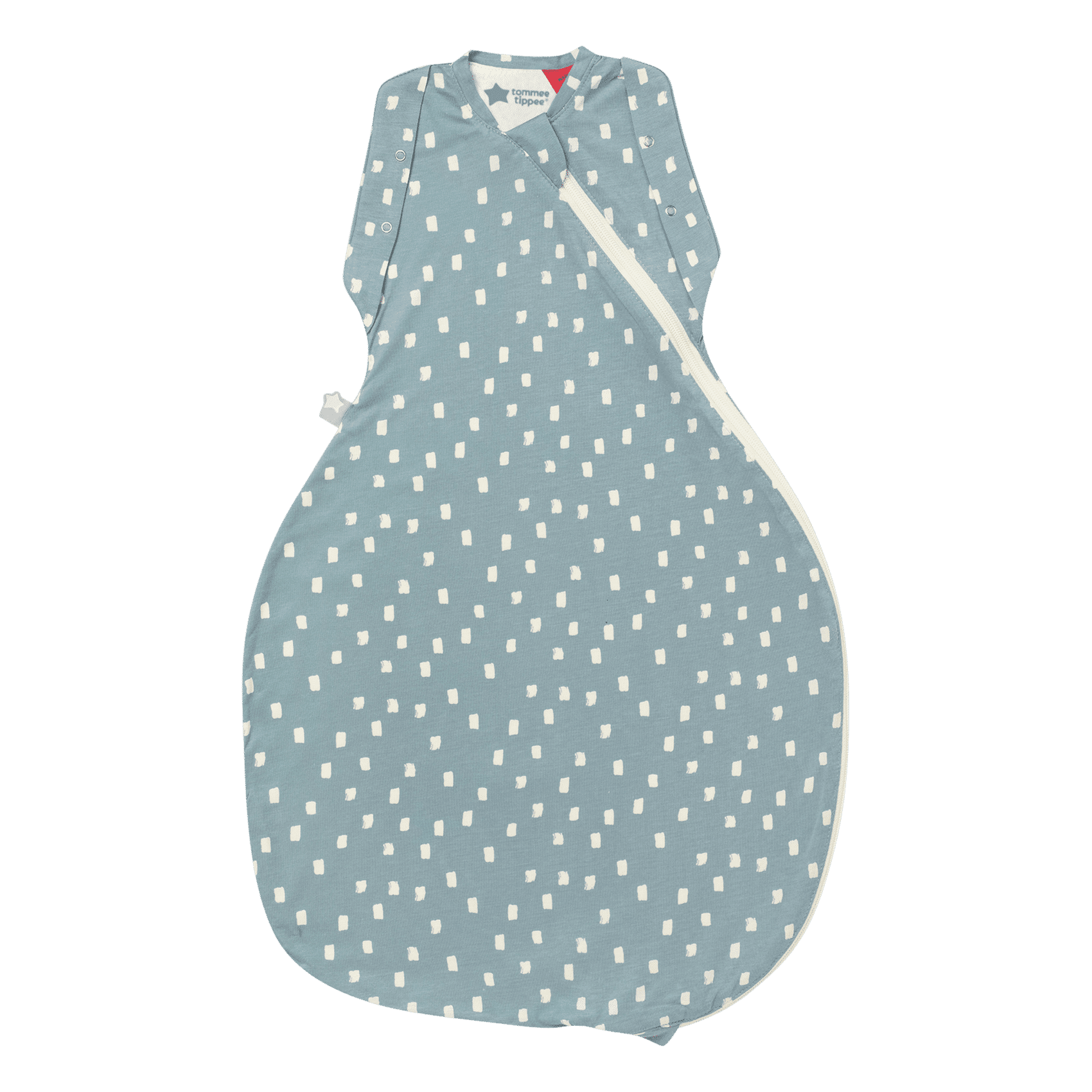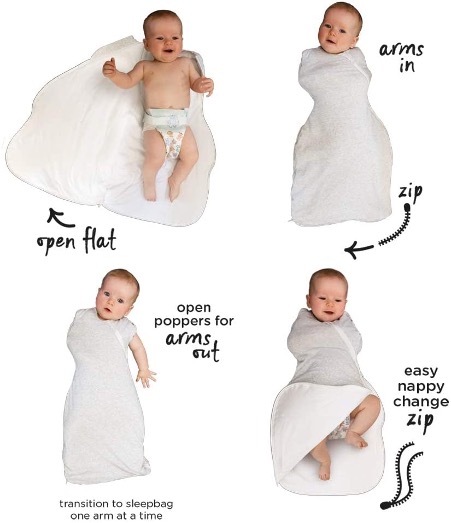Product Support
Get help with products
Stuck on how to use one of our products?
Not sure how to clean them?
Find all the useful support information right here.

Getting Started
Support Details
Swaddlebag Support
Thanks for purchasing a Tommee Tippee Swaddlebag. This product support page is here to help you use your new Grobag safely, and to ensure that both you and your little one sleep soundly.
Our Swaddlebag is designed for use from 0 to 6 months.
Safety reassurance
Our Swaddlebags conform to the European safety standard for children’s sleepbags EN 16781:2018 and the Australia/New Zealand nightwear standard AS/NZS 1249:2014.
Swaddlebag Features & Benefits
What are the benefits of swaddling?
Swaddling is proven to improve quality young babies’ sleep. During the first months of their lives, young babies love to feel all snug and secure, just like when they were in mummy’s tummy. Having their arms tucked into their body mimics the closeness of the womb and suppresses their startle reflex (when their hands and body to jerk during sleep), so baby – and you – will get more sleep.
It also…
- Keeps your little one warm during the first few months when their ability to regulate their own body temperature is still developing.
- Helps them to focus on feeding by keeping their arms and legs tucked in.
- Stops them scratching themselves with their nails as they sleep.
How do I wash my Grobag?
We recommend that you wash your Grobag before the first use. Always close the zip before washing, gentle machine wash at 40°C, and then reshape while damp or tumble dry on low heat.
You can use a warm iron but don’t iron over the back neck label.
What is ALOEKIND™?
Our luxury Grobags are made using cosy, bamboo rich fabric and a signature ALOEKIND™ lining. ALOEKIND™ is a unique cotton blend that’s infused with naturally soothing Aloe Vera and so it’s extra kind to baby’s sensitive skin.
SnugFit™ Intent
The International Hip Dysplasia Institute (IHDI) acknowledges the Swaddlebag as a hip-healthy product when used as directed. Slim fitting through the chest, with a roomy, hip-healthy bottom to allow your baby to adopt a natural "frog legged" sleeping position, which is important for correct hip development. This is especially important during the early stages of hip development in the first few months after birth.

Zip fastening
The zip starts near the baby’s chin and finishes at their feet for improved comfort and reduced risk of skin irritation, as well as making it easier to comfortably secure arms inside.
When fastening, it’s important to make sure that the zip slider is fully engaged, right at the top of the zip before sliding to close.
The easy zip opening is also perfect for night-time nappy changes as you can unzip from the bottom, whilst keeping baby cosy and warm at the top.
Why does my new Grobag have a red fire warning label?
We take our responsibilities in this area very seriously and from 2022 our Grobags are going global! We’re still using the same premium fabrics but with extra precautions to ensure our Grobags meet all the regional safety regulations.
In Australia and New Zealand, all night wear for children aged 6 months to 14 years must carry a fire warning label. These safety standards are mostly based on the risk of the garment being exposed to an open flame. Any garments which hang loosely and are made from a more flammable natural fabric (e.g., cotton) must carry the high fire danger label.
When should I transition my baby from a swaddle to an arms-out Sleepbag?
It’s time to move on from swaddling when your baby begins to show signs of rolling from their back onto their front. With our Swaddlebag, you can release one arm at a time so that your baby can get used to their new way of sleeping. It may take a while for them to get used to, so try one arm out for a week or two, followed by the other arm.

Swaddlebag Size Guide
Your child's head should not be able to pass through the neck hole when the Swaddlebag is fastened. If it can, the Grobag is too big for them. Remember to check the weight of your child and refer to the chart below.
Please note that these are recommendations only as all babies are different…
|
Approximate child age |
Minimum child weight |
Maximum child weight |
Child height |
|
0-3 months |
3.2kg / 7lbs |
6.1kg/13lbs 8oz |
Up to 62cm |
|
3-6 months |
6.1kg/13lbs 8oz |
8.2kg/18lbs |
62-68cm |
Swaddlebag Tog Guide
What are togs?
A tog measurement is a European warmth rating: the higher the tog, the warmer the product. It’s a measure of warmth, rather than thickness.
Always consider the room temperature when selecting your child’s sleepwear, rather than the outdoor temperature. If you’re unsure, we recommend that you use a room thermometer.
The Swaddlebag is available in three tog ratings…
|
0.2 Tog |
1.0 Tog |
2.5 Tog |
|
For hot nights |
For warm nights |
For cool to warm nights |
|
24°C (75ºF) and above |
20-24°C (68-75ºF) |
16-20°C (61-68ºF) |
Swaddlebag What to Wear Guide
Several factors determine which tog rating should be used. These include the number of clothes your baby is wearing, the temperature of their bedroom and your baby's health.
Because all babies are different, we recommend that you check your baby regularly as they sleep by placing your hand on their skin to make sure that they’re not too hot or cold. Don't go by their hands or feet, as they'll often feel cooler.
For more information, please take a look at our simple what to wear guide.
|
Nursery Temperature |
Tog |
Bedtime Clothing |
||
|
27°C and above (81°F and above) |
0.2 Tog |
|
||
|
24-27°C (75-81°F) |
0.2 Tog |
(arms in) or (arms out) |
||
|
22-24°C (72-75°F) |
1.0 Tog |
(arms in) or (arms out) |
||
|
20-22°C (68-72°F) |
1.0 Tog |
(arms in) or (arms out) |
||
|
18-20°C (64-68°F) |
2.5 Tog |
(arms in) or (arms out) |
||
|
16-18°C (61-64°F) |
1.5 Tog |
(arms in) |
||
|
16-18°C (61-64°F) |
1.0 Tog |
+ (arms out) |
||
|
Guide Key |
|
|||
|
Nappy |
Sleeveless cotton body suit |
|
||
|
Short-sleeved cotton body suit |
Long-sleeved cotton body suit |
|
||
|
Pyjamas |
Sleepsuit |
|
||
|
|
|
|
|
|
WARNING!
- Do not use a Grobag in combination with other bedding items e.g., a cot duvet or blanket.
- When your child starts to roll over ensure you use with arms out.